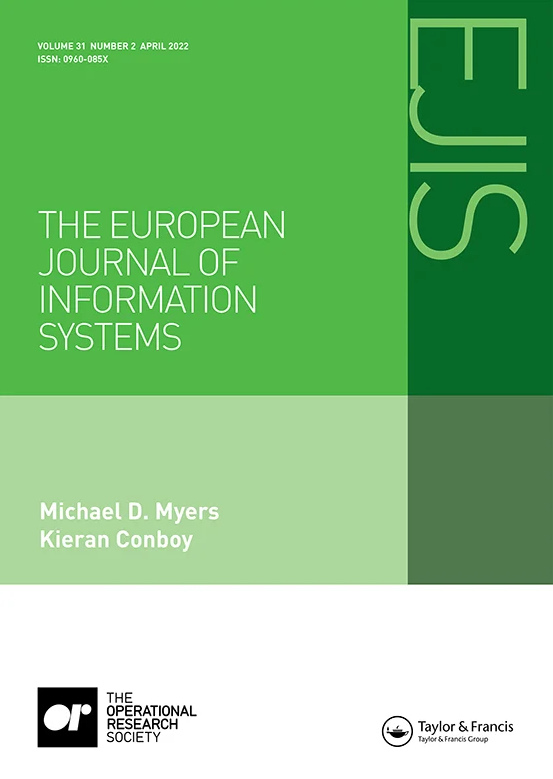
EJIS - volume 29 - 2020 论文列表 |
| 点击这里查看 European Journal of Information Systems 的JCR分区、影响因子等信息 |
Volume 29, Number 6, 2020
Andrea Carugati Lapo Mola Loïc Plé Marion Lauwers Antonio Giangreco
Does the end justify the means?Information systems and control society in the age of pandemics.Aurélie Leclercq-Vandelannoitte Jeremy Aroles
Digital contact-tracing adoption in the COVID-19 pandemic: IT governance for collective action at the societal level.Kai Riemer Raffaele Ciriello Sandra Peter Daniel Schlagwein
Effects of structural and trait competitiveness stimulated by points and leaderboards on user engagement and performance growth: A natural experiment with gamification in an informal learning environment.Laura Amo Ruochen Liao Rajiv Kishore Hejamadi Raghav Rao
Ingredients for successful badges: evidence from a field experiment in bike commuting.Zachary J. Sheffler De Liu Shawn P. Curley
Choose your own training adventure: designing a gamified SETA artefact for improving information security and privacy through interactive storytelling.Ersin Dincelli InduShobha N. Chengalur-Smith
Capturing the complexity of gamification elements: a holistic approach for analysing existing and deriving novel gamification designs.Sofia Marlena Schöbel Andreas Janson Matthias Söllner
From Elements to Structures: An Agenda for Organisational Gamification. Desperately seeking the artefacts and the foundations of native theory in gamification research: why information systems researchers can play a legitimate role in this discourse and how they can better contribute.Volume 29, Number 5, 2020
Martin Adam Dominick Werner Charlotte Wendt Alexander Benlian
Resilience against crises: COVID-19 and lessons from natural disasters.Mihoko Sakurai Hameed Chughtai
Virtually in this together - how web-conferencing systems enabled a new virtual togetherness during the COVID-19 crisis.Janine Hacker Jan vom Brocke Joshua Handali Markus Otto Johannes Schneider
Contact-tracing apps and alienation in the age of COVID-19.Frantz Rowe Ojelanki K. Ngwenyama Jean-Loup Richet
Effects of peers and network position on user participation in a firm-hosted software community: the moderating role of network centrality.Xiaolei Wang Terence T. Ow Luning Liu Yuqiang Feng Yuan Liang
Ideological shifts in open source orchestration: examining the influence of licence choice and organisational participation on open source project outcomes.Poonacha K. Medappa Shirish C. Srivastava
Orchestrating automation and sharing in DevOps teams: a revelatory case of job satisfaction factors, risk and work conditions.Aymeric Hemon Frantz Rowe Laetitia Monnier-Senicourt
Understanding how DevOps aligns development and operations: a tripartite model of intra-IT alignment. The evolution of software development orchestration: current state and an agenda for future research.Volume 29, Number 4, 2020
Lena Waizenegger Brad McKenna Wenjie Cai Taino Bendz
One app to trace them all? Examining app specifications for mass acceptance of contact-tracing apps.Simon Trang Manuel Trenz Welf H. Weiger Monideepa Tarafdar Christy M. K. Cheung
Information Technology and the pandemic: a preliminary multinational analysis of the impact of mobile tracking technology on the COVID-19 contagion control.Andrew Urbaczewski Young-Jin Lee
Chasing John Snow: data analytics in the COVID-19 era.Jesse Pietz Scott McCoy Joseph Wilck
Enabling collaboration and innovation in Denver's smart city through a living lab: a social capital perspective.Valerie L. Bartelt Andrew Urbaczewski Andrew G. Mueller Suprateek Sarker
Exploring smartness in public sector innovation - creating smart public services with the Internet of Things.Ott Velsberg Ulrika H. Westergren Katrin Jonsson
Efficiency creep and shadow innovation: enacting ambidextrous IT Governance in the public sector. IT-enabled innovation in the public sector: introduction to the special issue.Volume 29, Number 3, 2020
Samuli Laato A. K. M. Najmul Islam Muhammad Nazrul Islam Eoin Whelan
Examining the interplay between big data analytics and contextual factors in driving process innovation capabilities. Digital transformation and the new logics of business process management.Abayomi Baiyere Hannu Salmela Tommi Tapanainen
Architectural alignment of process innovation and digital infrastructure in a high-tech hospital. Building a complementary agenda for business process management and digital innovation. Information systems in the age of pandemics: COVID-19 and beyond.Volume 29, Number 2, 2020
Nick Benschop Cokky A. R. Hilhorst Arno L. P. Nuijten Mark Keil
The complementarity of autonomy and control in mobile work.Amanda J. Porter Bart van den Hooff
Gamifying knowledge sharing in humanitarian organisations: a design science journey.Adrian Holzer Bruno Kocher Samuel Bendahan Isabelle Vonèche Cardia Jorge Mazuze Denis Gillet
The impact of control styles and control modes on individual-level outcomes: a first test of the integrated IS project control theory.Ulrich Remus Martin Wiener Carol Saunders Magnus Mähring
Feedback at scale: designing for accurate and timely practical digital skills evaluation.Gabriele Piccoli Joaquin Alfredo Rodriguez Biagio Palese Marcin Lukasz Bartosiak
Artefactual and empirical contributions in information systems research.Volume 29, Number 1, 2020
Antti Salovaara Bikesh Raj Upreti Jussi Nykänen Jani Merikivi
Conceptualisation and validation of system use reduction as a self-regulatory IS use behaviour. IT value creation in public sector: how IT-enabled capabilities mitigate tradeoffs in public organisations. Advancing a NeuroIS research agenda with four areas of societal contributions.Jan vom Brocke Alan R. Hevner Pierre-Majorique Léger Peter Walla René Riedl
Artificial intelligence as digital agency.
